A.7 ROUNDTABLE A Current and Critical Evaluation of Ethics in Creative Methods and Scholarship
Thu Oct 15 / 9:00 – 10:30
voice_chat expiredchairs /
- Lois Klassen, Simon Fraser University
- Stéphanie McKnight (Stéfy), Carleton University
Since 2017, creative practitioners from across Canada have come together at UAAC to discuss research-creation practice issues. This year, the Research-Creation Roundtable is focused on ethical issues emerging from current practices of academics engaged in research-creation methods. Three case studies describe issues emerging from practice, including: ethical challenges inherent in autoethnographic methods used by artists and creative researchers; integrating ethical reflection into creative media production about refugee experiences; and, the expanded ethical considerations of land-based art and research practices in decolonial contexts. In each case institutions’ research ethics review processes are incomplete in managing the complex and expansive needs presented by research creation in non-academic settings. This roundtable is expected to generate critical discussions to deepen the ethical acuity of practitioners engaged in research-creation while at the same time challenging research ethics review processes to develop standards and approaches that reflect and build on current practices.
Lois Klassen is a Post-Doctoral Fellow at the School of Interactive Art & Technology, SFU. Klassen’s academic research focuses on ethics and participatory art practices – a topic she covers for the Canadian Association of Research Ethics Boards Circle of Experts. Deliberately facing ethical demand by way of social, aesthetic and material methods Klassen’s Reading the Migration Library invites collaborations in publishing and distribution of pamphlets, chapbooks and ‘zines related to current and historic approaches to human migration. She was a 2020 Fulbright Fellow at University of Texas in El Paso (Center for Inter-American Border Studies and the Ruben Center for the Visual Arts). Lois Klassen completed a PhD in Cultural Studies at Queen’s University in 2019, a Master of Applied Art at Emily Carr University of Art + Design in 2011, and a Diploma of Art History from University of British Columbia in 2008. Klassen serves as the coordinator of the Emily Carr University Research Ethics Board.
Stéphanie McKnight (Stéfy) (she/her) is an Assistant Professor in the Media Production and Design program at Carleton University. She is a queer white settler artist-scholar based in Katarokwi/Kingston. Her creative research examines surveillance and policing as contemporary colonialism in Canada post-9/11. Stéfy’s creative work takes several forms, such as installation, performance, site-specific, online and technological curatorial projects, new media and experimental photography. Stéfy is a member of the performative duo Cam Hunters with Dr. Julia Chan. Their most recent project Cam Hunters: the podcast discusses the pervasive and ubiquitous ways that surveillance is integrated in our personal lives. In 2017, Stéfy founded the UAAC/AAUC Research-Creation Caucus, that has met annually to discuss current trends and themes in Research-Creation in the academy. Her research-creation projects have been exhibited across Ontario. In 2018, her work Hunting for Prey received an honourable mention for the inaugural Surveillance and Society Art Fund Prize.
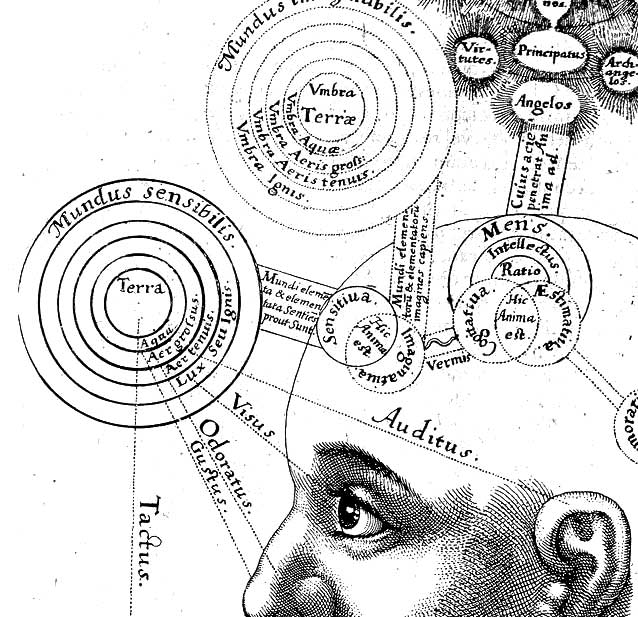
Robert Fludd, Utriusque cosmi maioris scilicet et minoris […] historia, tomus II (1619), tractatus I, sectio I, liber X, De triplici animae in corpore visione.
A.7.1 Responding to Emerging Ethical Issues in Autoethnographic Research
- Christine Crisol, OCAD University
- David Griffin, OCAD University
Autoethnographic research methods have long been exempt from research ethics board review at OCAD University (OCAD U). However, the broad expansion in our faculty and student-researchers’ use of autoethnography in data collection and analysis, across faculties and programs, has raised a number of questions that indicate a need for ethical oversight to protect both the individuals who appear in the research, and to protect researchers themselves as participants. It has been the experience of our REB that this growth gives us a range of fascinating problems in ethical review, due for example to the inclusion of sensitive topics tangentially involving incidental participants, or the emergence of potential harms - unclear because unanticipated - to the researcher.
The peculiar, amorphous nature of the research in which our institution engages, led to the OCADU REB’s decision in early 2020 to take the view that anyone who features or provides data, including the researcher, are considered human participants for REB purposes. As such, these individuals should be afforded the same rights as all human participants, namely, justice, concern for welfare, and respect for the individual (Tri-Council Policy Statement, 2nd Edition, 2018). To support this view, the OCADU REB developed guidelines and a questionnaire to help researchers recognize the need for ethics approval when undertaking autoethnographic research. Derived from Tolich (2010) and the TCPS2, the guidelines reflect consideration of four key elements: risk, vulnerability, confidentiality and privacy, and consent. In addition, the OCAD U REB created a review rubric adapted from Richardson’s five criteria for evaluating autoethnographic research (2000). We would love to engage in a conversation about problems and solutions that our colleagues can see in our premises and our response.
Christine Crisol is the Manager for Research Policy and the Research Ethics Board at OCAD University. She has been involved in academic and professional research for over 20 years. Her personal research areas focus on food history and traditions, and evaluating the efficacy of projects designed for vulnerable communities.
David Griffin works with drawing and colour, seeking the right question. Dr. Griffin holds a PhD from the Glasgow School of Art, an MFA from the Pratt Institute, and a BFA degree from Parsons School of Design. He has published his theoretical writing on diagrammatic drawing methods and music notation systems most recently in the Intellect Press’ Drawing: research theory practice (2018), and has exhibited and presented his art and scholarship at the 2018 UAAC-AAUC Conference in Waterloo, at the New School in New York in 2016, and Cambridge University in the UK, among other places.
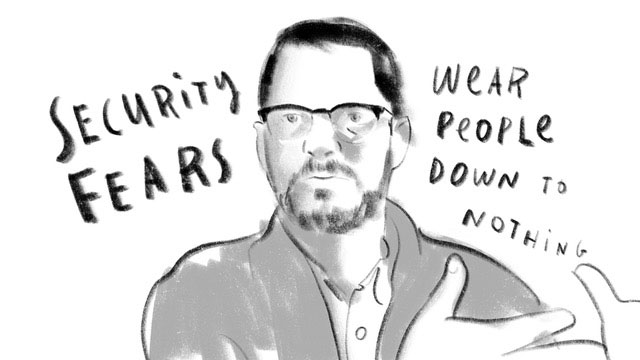
Borderstory, 2020 (video still), Erin Goheen, Director.
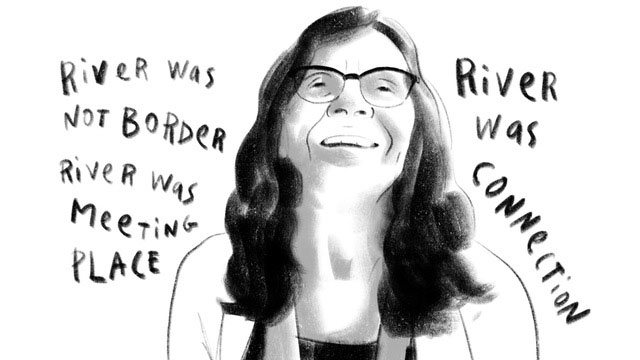
Borderstory, 2020 (video still), Erin Goheen, Director.
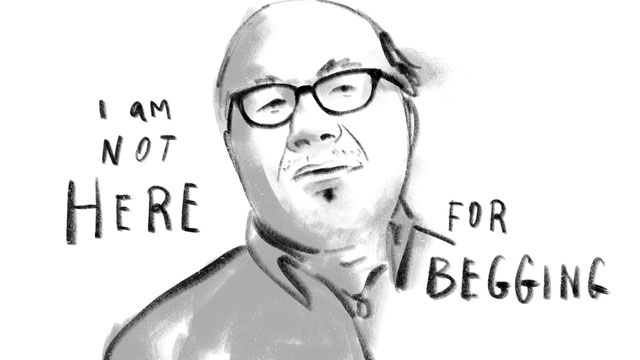
Borderstory, 2020 (video still), Erin Goheen, Director.
A.7.2 The Worn Words Project: The Ethics of One Multimedia Mobilization of Refugee Cultures
Erin Goheen Glanville, University of British Columbia
This paper presents the praxis of the SSHRC-funded postdoctoral project, Digital Storytelling as a Method for Critical Dialogue on Refugees in Canada or Worn Words. The practice of research interviews, animation, and filmmaking were conceptualized and theorized as cultural refugee studies, producing a refugee knowledge mobilization praxis dependent on slow, relational, collaborative, and creative ethics. This research is an experiment in breaking the patterned narrations of refugee lives, through ethical praxis that combines creative media making practices and critical refugee theory. Given the project’s theme and its digital dissemination, the methodology and methods deeply engage the dilemma of how to do ethical community-involved research with vulnerable populations. Going beyond establishing and following ethical principles in a research protocol, Digital Storytelling embeds questions about ethical refugee research into and across two years of media production practice. The potential public and long term aim of this praxis is to re-narrate refugee discourse in uncommon ways and so to mobilize it for constructive public dialogue that cultivates deep listening. The ethical challenge of making media that resists being subsumed into prevalent frames for refugee cultures and that also remains responsible to the communities being represented has salience intellectually, relationally, and politically. Intellectually, the project is asking, what does critical theory look like in the process of ethical media making and in the form of creative digital narratives? Relationally, the project is asking, how can researchers and media makers remain responsible to refugee claimant communities — put plainly, can I remain in good relationship with my community networks once this project is completed and disseminated? Politically, as assaults on global asylum rights intensify, so does the urgency of constructively engaging humanitarian storytelling traditions, rather than simply critiquing them.
Erin Goheen Glanville is a researcher in literary cultural studies and forced migration narrative. She teaches at the University of British Columbia in the Coordinated Arts Program and serves on the Board of Directors for Kinbrace Community Society, BC's oldest refugee claimant housing provider.
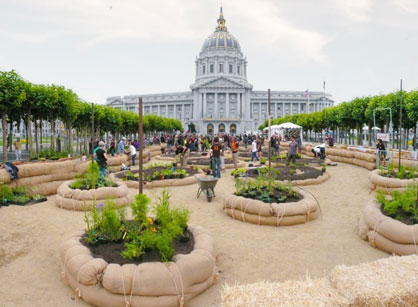
Futurefarmers, Victory Gardens, 2007, Civic Center Plaza, San Francisco (A Common Field Collective Member's Project)
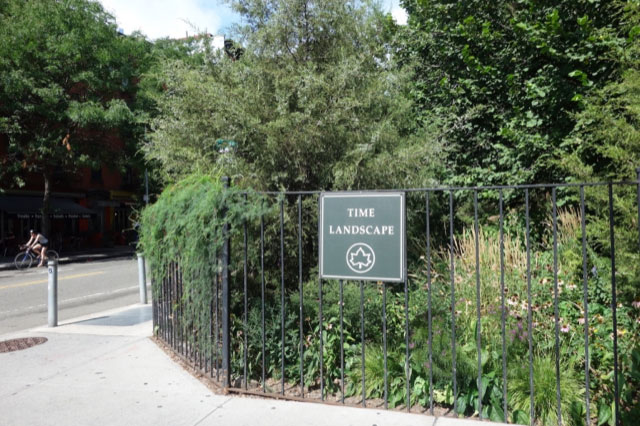
Alan Sonfist’s Time Landscape 1965-1978-2016 at the corner of LaGuardia Place and West Houston Street, NYC (photo by Allison Meier for Hyperallergic)
A.7.3 When Research in a Research-Creation PhD Discourages Further Research or Creation in Academic Spheres and in the Public Realm
Jill Price, Queen’s University
Hyper-sensitive about my Canadian settler history amidst a culture that remains complicit in the ecological extraction and devastation of Indigenous land at home and abroad, I have come to recognize how the art world is part of the capitalist machine that contributes to the material excess that colonizes living and shared landscapes. Particularly critical of land-based art practices that deny the multi-species ecologies and histories of sites and art about the anthropocene that carries forward colonial, capitalist, patriarchal and resource perspectives and approaches to land, my comprehensive exam set out to answer,
“Given a requirement for truth and reconciliation, what does it mean for settler-identified artists to contribute to redressing the altered and diminished ecology of sites that symbolize, honor and amplify colonial histories?”
Specifically proposing to speculate on unmaking the colonial aesthetics and ecological sterility of lawns found at settler and militaristic historic sites such as Fort Henry, this paper explains how my comprehensive exam; exploring the science of trees and climate change in conjunction with the political realities of decolonization, reparation theory and non-representational theory, produced a number of conceptual paradoxes, practical difficulties and calls to action for self-identified white settler artists to unmake themselves from pursuing ecological research, remediation and presentation in public and academic spheres. Asked to pay special attention to land-based artists’ responsibilities to involve Indigenous perspectives, this paper also reveales how researching, citing and building relationships with Indigenous persons for the purpose of economic or academic gain brings about many other ethical issues unresolvable through parameters and procedures outlined by General Research Ethics Board (GREB, Queen’s University) and exasperated through graduate study timelines, graduate funding parameters, hierarchies of scholarship and academic silos of learning still firmly rooted within individualistic modes of knowledge acquisition and academic performance.
Jill Price is a professional artist, curator and educator who received her BFA and BEd at Western University. Awarded a 2016 SSHRC, 2017 Michael Smith Foreign Study Bursary and the 2017 Research & Writing Award for her OCADU MFA thesis Land as Archive, Price was the recipient of a 2018-2019 Alfred Bader Graduate Fellowship and the Faculty of Arts and Science Dean’s Award for Environmental Justice upon her entrance to Queen’s University for a PhD in Cultural Studies. Framing her research and practice amidst theories of new materialism, ecological ethics and re-craftivism, Price utilizes duration performances and methods of deconstruction and abstraction to investigate how unmaking can offer artists a methodology to move beyond colonial perceptions and practices towards land so as to assist in making reparations to the cultural/natural commons.



